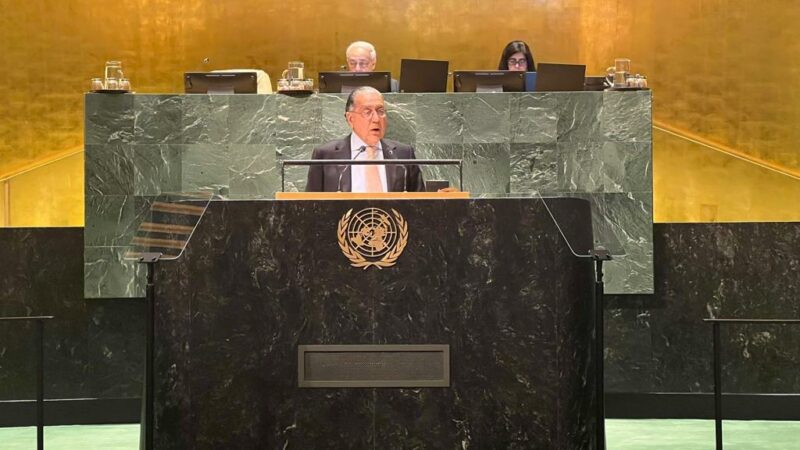Pakistan says use of nuclear technology in healthcare sector high priority
Ambassador Munir Akram hails IAEA support to member states.
NEW YORK: Pakistan has appreciated efforts made by International Atomic Energy Agency in advancing the use of peaceful nuclear energy for sustainable development and resilient economies.
Speaking at a discussion in the UN on a report of the IAEA, Pakistan’s permanent representative to the UN Munir Akram said the report provides a comprehensive overview of the significant activities of the Agency, including the development and transfer of nuclear technologies for peaceful applications, the enhancement of nuclear safety and security, and the strengthening of nuclear verification and non-proliferation efforts on a global scale.
Despite the continued challenges posed by the COVID-19 pandemic in 2022, the IAEA maintained its commitment to fulfilling its mandate.
“We particularly commend the Agency’s swift response to Member States’ requests for assistance in overcoming the consequences of regional or global medical emergencies, natural disasters, and industrial accidents.”
The ambassador said Pakistan firmly supports the Agency’s continued assistance to member states in their pursuit of addressing diverse development challenges through the safe, secure, and sustainable utilization of nuclear science and technology. This is a true reflection of the agency’s motto: “Atoms for peace and development.”
He added that Pakistan has been a significant beneficiary of the agency’s support and has effectively employed nuclear science and technology in various sectors, including healthcare, agriculture, power generation, industry, and environmental protection.
IAEA Director General Rafael Mariano Gossi’s visit to Pakistan earlier this year further bolstered the ongoing collaboration between Pakistan and the Agency, which has been mutually beneficial and enduring.
The application of nuclear technology in the healthcare sector remains a high priority for Pakistan. A total of 19 cancer hospitals, operated by the Pakistan Atomic Energy Commission, provide vital care to over 80% of our cancer patients.
During Director General Grossi’s visit, he inaugurated the first Cyber Knife Facility at the Nuclear Medicine, Oncology, and Radiotherapy Institute (NORI) in Islamabad. We take pride in the designation of this Institute as an Anchor Centre under the Agency’s “Rays of Hope”: Cancer Care for All initiative.
Pakistan has been a leading partner in the IAEA’s Technical Cooperation Programme. Pakistan has aligned its Technical Cooperation Programme with the Agency’s Mid-Term Strategy to achieve substantial results. We stand ready to share our experiences in designing and implementing comprehensive TC projects with fellow members of the global south. The Practical Arrangement signed between Pakistan and the Agency’s TC Department is a manifestation of this commitment.
The devastating impacts of climate change have amplified the vulnerabilities of several countries and people worldwide. The catastrophic floods in Pakistan last year underscore the urgent need for global action to reduce greenhouse gas emissions. One-third of Pakistan was submerged, affecting 33 million people and causing losses and damages amounting to a tenth of Pakistan’s’ GDP. Such global challenges demand global solutions, close and unrestricted cooperation among member states.
We firmly believe that nuclear power has a vital role in mitigating and adapting to climate change and transitioning to a low-carbon energy future. Pakistan shares the view that nuclear power is an affordable, reliable, and environmental-friendly energy source.
Pakistan has extensive experience in operating a safe, secure, and fully safeguarded nuclear power program. We currently operate six nuclear power plants with a combined capacity of 3,530 MW. We aim to increase the share of nuclear power in our national energy mix. In this regard, we have commenced the construction of another nuclear power plant, Chashma Unit 5, with a capacity of 1200 MW.
International cooperation and dialogue are of central importance in fostering an enabling environment to unlock the full potential of nuclear power. We underscore that removal of barriers for gaining equitable and non- discriminatory access to civil nuclear cooperation is of fundamental importance.
We share the view that all States should fully comply with their respective safeguards obligations. At the same time, the Agency’s safeguards should not be used to serve partisan political objectives. Its verification regime will remain credible only if it is applied on a nondiscriminatory basis as stipulated in the Agency’s Statute.
Pakistan places the highest priority on nuclear safety and security as a national responsibility. We are party to several leading international instruments related to nuclear safety and security. We have established a robust and rigorously enforced nuclear safety and security framework that complies with the highest global standards. The Pakistan Nuclear Regulatory Authority (PNRA) is an independent national regulator, responsible for ensuring compliance with applicable standards in nuclear installations and radiation facilities throughout the country.
Pakistan’s National Institute of Safety and Security (NISAS) has become an IAEA Collaborating Centre for Nuclear Security Education, Training, and Technical Support, highlighting our expertise in this crucial domain.
Our Centre of Excellence for Nuclear Security (PCENS) has evolved into a regional and international hub for providing high-quality nuclear security training.


Comments are closed.